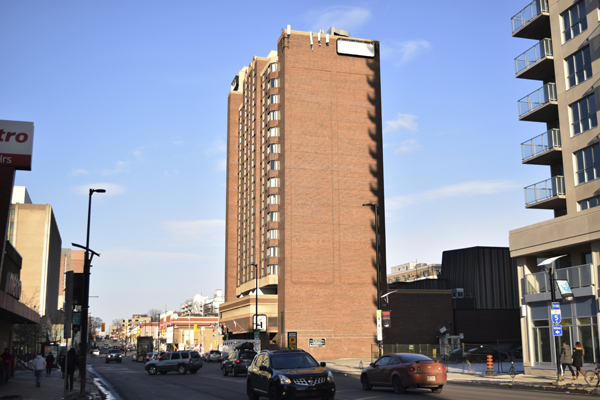Shortlisters discussed disarmament, COVID-19, and climate change
The University of Ottawa’s Centre for International Policy Studies (CIPS) awarded its first-ever annual CIPS Blog Award on Sept. 28 to associate law professor John Packer.
In the first stage of the competition, a panel of three impartial judges shortlisted five blogs out of all the blogs published by CIPS in the past year. The shortlisted blogs were announced Sept. 21, and readers voted to select the top blog of the year.
John Packer
The inaugural winner of the award was professor John Packer, who is also director of the Human Rights Research and Education Centre (HRREC) at the University of Ottawa. His blog ‘MBS admits “full responsibility” for the Khashoggi murder: what this means for the Kingdom’s allies’ was originally published on Oct. 1, 2019.
Packer said he was surprised to hear his blog had been voted the winner, but was glad to know that people had paid attention.
Packer discussed the case of journalist Jamal Khashoggi who was murdered inside the Saudi Consulate in Istanbul last year. He lays out evidence pointing to Saudi Crown Prince Mohammed bin Salman’s direct involvement in the murder, and subsequent destroying of evidence and undermining the possibility of a meaningful investigation.
“There needed to be a clear and forceful reaction of the international community,” Packer said in an interview with the Fulcrum. “Unfortunately, what we’ve seen is the opposite.”
Having made his case for Saudi Arabia’s complicity in the murder, Packer writes that countries should reconsider their diplomatic relations with the Kingdom and, in particular, their attendance of this year’s G20 summit which is currently set to take place in Saudi Arabia.
As an expert in international law, he chose to write on the topic after his involvement in organizing the first Arab Diaspora conference in Canada, at which Kashoggi was booked as a speaker. Sadly, Kashoggi was killed before the conference, and the facts of his murder soon became known. For Packer, his personal connection with the case as well as its relevance in terms of international law were behind the blog post.
Packer also said despite not being a major power, Canada could do more. As one example, there should have been clear support for the inquiry by the United Nations Special Rapporteur on Extrajudicial Executions, the report of which was released in June of 2019.
“That kind of pressure really should have been brought to bear,” Packer said.
As winner of the CIPS blog award, Packer was awarded $250 to disperse to a charity of his choice. The monetary prize will go to the University of Ottawa section of Scholars at Risk.
Although Packer said the piece on Kashoggi was a one-off, he will continue to work on the larger issues behind it. He is currently involved in the development of a podcast called Voices which will seek to amplify the voices of activists exiled in Canada.
Rita Abrahamsen
Another shortlisted piece was the collaborative article ‘Constructing the Liberal Enemy: The International Political Sociology of the New Right’ by Rita Abrahamsen, Jean-Françios Drolet, Alexandra Gheciu, Karin Narita, Srdjan Vucetic, and Michael Williams.
Published in February, Abrahamsen and her co-authors share analysis of the global rise of right-wing movements, which they call the ‘New Right.’ They point out that these movements are not isolationist, but often coordinated and acting along the lines of a similar worldview. The authors counter the idea that global right movements are “anti-intellectual”, describing how they are as a matter of fact based on a new and specific “sociology of the international order.”
Asked about how the pandemic might impact the trajectory of the Global Right, Abrahamsen said there is reason to be concerned that the crisis might increase the attraction of right-wing movements and groups. A rise in conspiracy theories, fake news, and traffic on the Dark Web are some of the concerning indicators that she flagged.
An economic downturn is also a risk factor because economic deprivation and unemployment could cause people to turn to right-wing movements, Abrahamsen said.
Abrahamsen and her co-authors will continue to study this topic through their research project based at CIPS called the Global Right, which looks at the rise of the movement in specific countries, as well as how these distinct movements are connected through similar ideology.
Abrahamsen, who is also director of CIPS, said the awards will become an annual occurrence and hopes they will draw more students to the blog.
“I think it is a very valuable resource for students because it can be quite hard these days to know what to trust,” said Abrahamsen. “The CIPS blog is what we call an expert blog. It’s written only by experts who really know what they’re talking about.”
Jacqueline Best
Jacqueline Best, a professor in the School of Political Studies, was also shortlisted for ‘Economic exceptionalism is back (if it ever went away).’ Economic exceptionalism, writes Best, is characterized by the suspension of the normal checks and balances of liberal democracy justified in terms of political and economic necessity.
Best describes how this exceptionalism takes two distinct forms: the first is emergency exceptionalism, employed in response to a temporary crisis; the second form, which Best calls technocratic exceptionalism, involves the subtle limiting of democratic oversight on a more long-term basis. In a critique that rings especially true given the government’s economic response to COVID-19, Best warns of a ‘new normal’ of economic exceptionalism.
“Our economy does need to be rescued regularly by the state … these exceptional measures, a lot of them are absolutely necessary,” she said, explaining that there is both a light and a dark side to such measures.
Best also flagged the dangers of such measures. “Rights can get trampled on in moments of exceptionalism … we do need to pay very careful attention to that and challenge the forms of exceptionalism that are hurting people.”
Ryan Katz-Rosene
Ryan Katz-Rosene, an associate professor with the Institute of the Environment at the U of O’s School of Political Studies was also recognized for his piece ‘The Pandemic, the Economy, and Climate Change: Three Takeaways So Far.’ In it, Katz-Rosene discusses how the COVID-19 pandemic has impacted climate change and our economic approach to tackling it.
Katz-Rosene said he decided to write this blog post in response to discussion in the popular sphere and on social media suggesting that the pandemic was ‘solving’ climate change.
In the blog, Katz-Rosene emphasizes that the pandemic has not been “good” for the climate, as many on social media have taken to espousing. He also said that although there has certainly been a measurable reduction in air pollution during the pandemic, that is different from the overall climate context, and that the overall concentration of carbon in the atmosphere is still going up.
When asked about the prospects of a green recovery, Katz-Rosene said that it all depends on what happens next. “It’s all about finding ways to achieve an economic benefit through a green economy as opposed to a dirty recovery. That’s really hard in the Canadian context.”
He also acknowledged the importance of prioritizing the health of society. “An equally important part of a green recovery is laying a really strong foundation of care in our society.”
Ernie Regehr
Ernie Regehr, was shortlisted for his piece ‘Disarmament Diplomacy in the Age of Putin and Trump.’ In his blog, Regehr describes the low state of nuclear diplomacy and reversal of progress towards disarmament in the leadership eras of Russian president Vladimir Putin and US President Donald Trump.
Regehr notes that a number of key international disarmament and nuclear non-proliferation treaties have been abandoned in recent years, calls on Canada and other middle powers and NATO allies to support the return to formalized nuclear non-proliferation.





